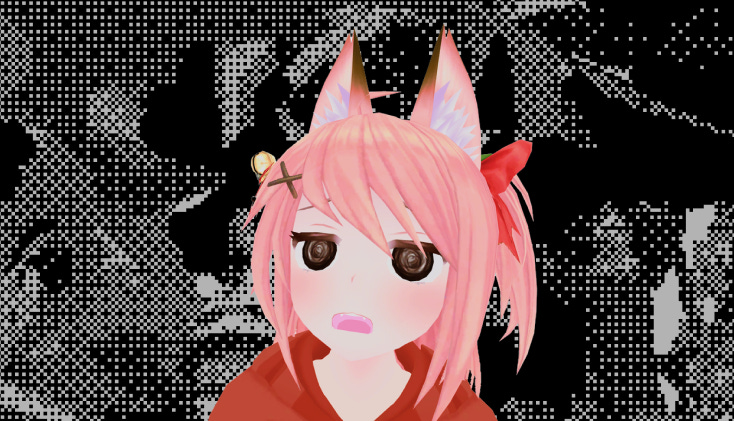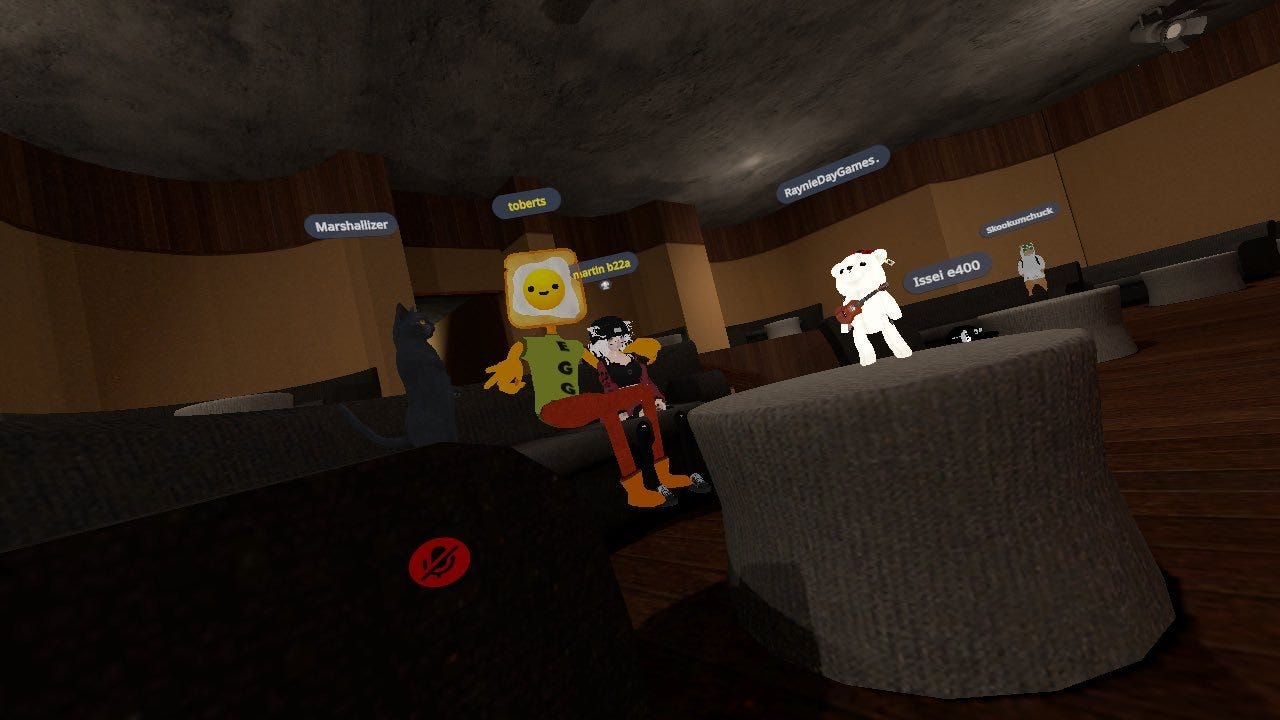VRChat and virtual reality headsets
Virtual reality can offer a vibrant and fun environment to spend time in, when the places and experiences are led by people — not big tech
In about ten years, your Zoom meetings will be conducted in a 3D world of your manager's making. You'll be wearing a somewhat bulky headset, in the summer your face will be permanently branded with the outline of your company-issued device, maybe the last guy who quit after three weeks used it before you and now you've developed a nasty rash too.
Doesn't that sound like fun? Does it make the fact you're earning six figures working remotely in the middle of nowhere taste even sweeter? All you can spend your money on is incrementally 'improved' and ever more invasive technology crafted delicately by the techno-corp elite — our peers. There are no fiery, homely, traditional northern Chinese flavours to be found here, my friend.
Meta, and less publicly, Microsoft, Apple and most of the other supermassive corporate overlords are on a very real quest to realise this. Please don't make the mistake of thinking Zuckerberg's catastrophic — yet joy inducing — collapse on the stock market is any indication most of it doesn't actualise.
I'm here to soothe your restless soul, dear reader. You might not even have to leave London once the threat of nuclear fallout passes. My experiences in the anime festival VRChat have induced me into a potentially myopic vision of the future where much like today, it won't be all bad.
In case you don't know, VRChat is a game played on virtual reality (VR) headsets. You can play it on your computer, but it's not the same. It's lawless, somewhat reminiscent of the internet around Y2K.
Despite my better judgment, I've spent quite a bit of time in VRChat, being bullied by 13-year-old doughnuts, ten-foot-tall hot dogs, and ponytail-clad alcoholic perverts from middle England. To my surprise, I've also had a lot of other fantastic experiences.
Me and my friend spent ages in one world — worlds are private or public rooms you can enter and meet other players — watching people get up on stage and perform music, dance, crack jokes and cause problems. We were accompanied by twenty or thirty other avatars, all watching, clapping, cheering and throwing confetti and snowflakes at ballsy performers. At one point, I was even compelled to get on stage and play the air guitar behind a convincing representation of some fan favourite anime character.
Writing this feels a bit embarrassing, but my experiences on VRChat felt more surreal than silly. Time spent in those vibrant worlds was more like being at the pub than in an online lobby.
I've got lots of good memories spending time in multiplayer games with people I've never met and may never speak to again. An unbalanced amount of my time has been spent raiding in World of Warcraft, playing League of Legends, and just hanging out on Teamspeak, Skype, and now Discord. It was fun. It never felt like I was at the pub, or sitting around the smoking area with my mates, though.
There were moments in VRChat when it did feel like that. When I could almost smell the funk on the hollow 3D walls. That's powerful.
At one point I was running away from a Freddy Kreuger avatar in a vibrant, lively world called The Great Pug. While I was running away from Freddy, I felt a distinct nostalgia for a place I visited as a kid. It took me back. Like, it really took me back. Almost like deja vu.
The YouTuber Straszfilms recalls that "there was a group laughing, just muffled enough that you knew they were having fun, but you couldn't tell why" in reference to their early jaunts around public worlds. I think those small things are what really ground environments in our memory. They are spatial and 3D. You just don't experience that in World of Warcraft or Discord.
Some people have much more tangible, impactful experiences.
Jessica Lucas writes about VTubing and chronicles the rise of popular VTuber Artsy — a VTuber represents and embodies themselves with a 3D avatar in their videos and livestreams. What stood out is that Artsy credits embodying the avatar and her experience interacting with an accepting community with helping her come out — “When I started VTubing with a female avatar, I realized that people would accept me as I am . . . It felt easier to exist. It made a huge difference.”
Another VTuber, Ms. Peep, “found that VTubing helped her to navigate feelings of dysphoria”. It played a role in alleviating difficult feelings about her body, she says that “It’s kind of like an escape. You have artistic freedom to present yourself however you want . . . It's like a mirror, but it shows you what you want to see. It’s powerful, but also comforting” — you should read the full article.
As a result of increasing numbers of these personal accounts, researchers are starting to examine how virtual platforms like VRChat can offer a safe space for people to explore gender expression and help address social anxiety. This isn't new or exclusive to virtual reality. You can find plenty of references citing the PC game Second Life as earlier cases of this. Google gender identity and VRChat and you'll find many videos, Twitter threads, writing, and research papers analysing this developing phenomenon.
People are the driving force, but VR facilitates a shift in how technology can impact lives in big and small ways, enabling more present and memorable online experiences.
Interesting advances were advertised during the cringefest Quest Pro keynote Meta hosted. Certainly save yourself the horror and watch Marques Brownlee's video if you want to see a roundup.
Three things stood out to me. First is the augmented reality (AR) experience of virtually attaching additional monitors to your laptop. Expanding your workspace without taking up excess room and potentially saving you money. Apple will come close to nailing this in their version of a VR headset — likely released next year. Of course, you'll only be able to use it with your Apple device.
Second, the face tracking technology that was demoed. The movement SDK allows developers to implement this feature in their own VR apps, the Quest Pro uses five infrared sensors, and a pre-trained AI — based on FACS a widely used coding method for human facial expressions — to map surprisingly realistic expressions to your player avatar. Obvious privacy concerns aside, this kind of information would make interactions on a platform like VRChat even more lifelike.
Finally, we got another update to photorealistic avatars, something Meta has been working on since at least 2019. The prototype is shockingly lifelike, and although technology such as this is a ways away from being implemented in real-time experiences, it paints a picture of a potential future.
We lose so much of ourselves on Zoom, staring at a screen. I'm not supposed to be confined to a box. I should be able to reach out and touch you. My voice should bounce off the walls and hit you from every angle. I should hear the muffled voices of a group having a good time across the room without being totally distracted, like Straszfilms in VRChat.
So, I think advances in this technology are going to propel remote work to new levels of popularity. When I'm running a remote workshop, given a choice, I'd pick VRChat over Zoom any day of the week. I wouldn’t pick Meta's Horizon Worlds. So, for me, the question is accessibility and further advances in VR devices that don't feel that far away.
VRChat is hard to navigate, that would need to change, but that's pretty easy. Meta's Quest Pro seems like the most significant advancement in device complexity yet, with facial motion features and no need for cameras set up around the room to track your movement. Make the headset less bulky, a bit less daunting, and it could catch on.
I want to run good remote workshops, and I want to work with people all over the world. Overall, people seem to prefer the flexibility and accessibility of working remotely most of the time, but working remotely can feel lonely. Onboarding is tricky. There's nothing quite like sitting with colleagues and chatting casually to develop unity and shared ownership.
It's OK to fly everyone out to company-wide events to achieve some of that — although not everyone can always make it for various reasons. In this new world of remote working, we need something that fills that gap. Slack and Zoom certainly don't.
I'm not here to push the term Metaverse. I don't care for it. A future even more controlled by corporations would be a miserable one. I think cryptocurrency is an abstraction and heightening of the problems our economies already experience, not a solution.
I'm leaning ever more heavily towards the idea that Zuckerberg's new frontier is inevitable, though. I just hope they don't own it. In its purest state, it would be governed not by corporations but by people, much like VRChat has been.
Anyone opining about the future has a responsibility to tell you that moderation of these emerging communities has already become incredibly difficult.
Nilay Patel wrote something brilliant last week about Elon's purchase of Twitter. He says, "the problems with Twitter are *not engineering problems*. They are *political problems*." The same will be increasingly true in a world dominated by augmented, mixed, and virtual reality — "trying to regulate how people behave is historically a miserable experience".
The more technology blurs the lines between reality and fantasy, the more we open people up to pain on our platforms. Builders have an enormous responsibility.
History tells us that giving control of these platforms to large corporations will not result in fun, freeing experiences like those that I and many others have experienced in platforms like VRChat. The technology is exciting, I think it does have a huge potential to shift the way we interact online in more pervasive ways than many people expect. But the technology is just one small piece of what makes VRChat a fascinating place to spend your time, the real driving force is the community that makes up those spaces.






